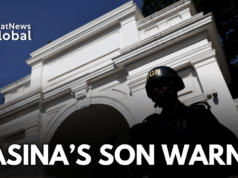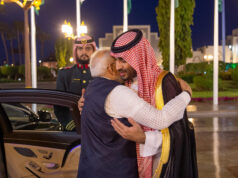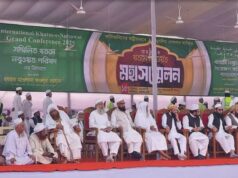“Sri Lanka is poised at a very delicate situation in its history right now,” says Padma Rao Sundarji, a veteran international correspondent who covered Sri Lanka extensively during the country’s civil war for Der Spiegel, and the recent Presidential election there for various Indian and foreign publications.
“Everything is dominated by the economic crisis. That is the number one problem, much more than the Chinese belt and Road Initiative,” she says. “China is its largest debtor. There is a chokehold of a debt trap on Sri Lanka from China. China is not being as pliant as India in reworking its debt repayment structure.”
India, on the other hand, “has been very, very generous,” she notes. “India has extended $4 billion. Plus it’s come to the aid of Sri Lanka time and again at a time when Sri Lanka needed it,” notes Padma Rao Sundarji, whose book, Sri Lanka, The New Country, examines the aftermath of the 26-year old civil war which ravaged the country till May 2009, when the dreaded LTTE was finally routed by the Sri Lankan Army.
Speaking about the September 21 Presidential election which brought Left-leaning politician Anura Kumara Dissanayake, or AKD, to power after a historic second round of counting, she pointed out that even though he was from the Janatha Vimukthi Peramuna, a revolutionary movement involved in two armed uprisings against the government in which over 60,000 people were killed, he came to power as the head of a coalition of leftist parties called the National People’s Party.
Though dominated by the JVP, the NPP is “quite a disparate group of people, activists, university professors, student leaders, union leaders, all kinds of different people, which likes to call itself more of a left leaning liberal organization,” she pointed out.
As for AKD, “So far we’ve not really heard and seen anything radical from him. But I think he is the right person right now. Because he’s got a squeaky clean reputation. He’s very clean. He comes from a very humble family,” she said.
“He speaks in a very humble and very appealing way. He’s a very good orator, and he doesn’t have any of the arrogance that some of the other prominent presidential candidates in this election displayed. So he’s a he seems to be a very likable person, on the surface of it” she said, while pointing out that likeable people don’t necessarily make good presidents.
“What’s making people wary is whether the NPP governance is going to be dominated by JVP philosophy or will the JVP philosophy change into the NPP’s philosophy, which is left liberal?” she said.
As for India, despite the big brother syndrome, (where smaller nations are inherently suspicious of a larger neighbour) which, “Sri Lanka certainly always had,” it “has gone down a little bit since they saw to what great extent India came forward and helped during the economic meltdown,” she said.
“Nobody else was willing to do that. Nobody else helped Lanka during this crisis as much as India did.” Unless India had “played a guarantor with the IMF, it would not have been possible for it to restructure and negotiate with the IMF. So, that is being seen as a plus point.”
Another significant point that she makes is that “during my talks with many Indian analysts” before and after the elections, they “expressed very cool confidence,” saying “you know, we don’t really care. Whoever comes to power, you know, I think our relations are going to stay smooth.”
To understand more about Sri Lanka’s election and get insights about its implications for India and the neighbourhood, watch the full interview.
In a career spanning three decades and counting, Ramananda (Ram to his friends) has been the foreign editor of The Telegraph, Outlook Magazine and the New Indian Express. He helped set up rediff.com’s editorial operations in San Jose and New York, helmed sify.com, and was the founder editor of India.com.
His work has featured in national and international publications like the Al Jazeera Centre for Studies, Global Times and Ashahi Shimbun. But his one constant over all these years, he says, has been the attempt to understand rising India’s place in the world.
He can rustle up a mean salad, his oil-less pepper chicken is to die for, and all it takes is some beer and rhythm and blues to rock his soul.
Talk to him about foreign and strategic affairs, media, South Asia, China, and of course India.




